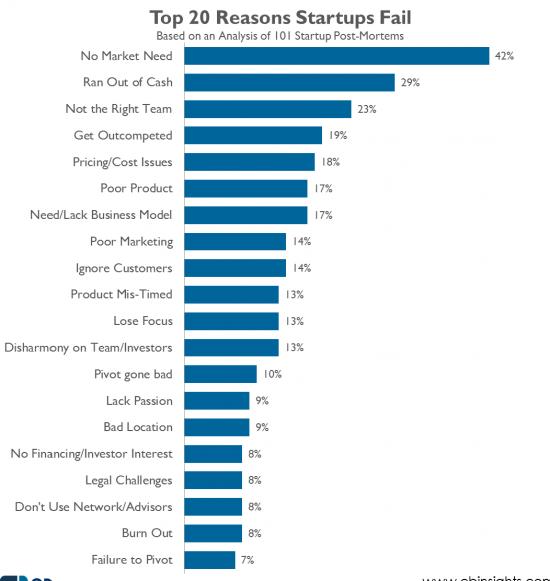
Richard Branson tells a story about entrepreneurship that points to a very basic character trait of successful entrepreneurs: resourcefullness.
He was booked on a flight to the Virgin Islands for a romantic getaway. The flight got cancelled, but he was not about to give up his weekend. He decided to charter a flight, even though he could hardly afford the cost. He then made a sign advertising the flight for $29 and held it up in front of his fellow travellers who had just been cancelled with him. He sold all of the seats on that flight and came away with his idea for Virgin Islands. This is how rapidly a business venture can begin.
Still, the statistics remain the same – 90% of all startups fail. And according to Fortune Magazine, here’s why:

Yet the other 10% succeed, sometimes amazingly. So, what is the difference? Some would say it is just plain guts; others say it is real business “smarts;” still others say it is the result of deliberate, careful, planning and execution.
The truth is, amazing companies have been founded and continue to thrive with all sorts of combinations of founder personalities and traits. There are, however, certain things that all successful founders do in common. Here are 10 of these things that can form your checklist as you launch.
1. Begin with a plan: No matter how rough and informal it may be, get down in writing what exactly what it is you plan to do. Think about these things:
- What is the product or service? Why is it better (or how can you sell it better) than competitors?
- How will you market the product or service?
- How much money will it take to launch and to keep going for the first year? (Include your own personal expenses). Do you have the money or where will you get it?
- Do you want a partner or not?
- What’s your goal for sales by the end of the first year?
2. Take care of “Housekeeping Tasks”: You need to find an attorney who can set up all of the legal and tax reporting aspects of your business. Don’t think you can do this yourself. You may need liability insurance; you may need to be a sole proprietor as opposed to an S-corp or a partnership. These are legal entities and must be registered.
There are other considerations as well. You need decent accounting software; you may need contracts if your business provides a service or if you will be using outside contractors for any aspect of your business.
3. Just start: No matter how small that first step may be – get going. Make a prototype of your product; write the first few lines of code; get your website up. Taking that first step is critical. It propels you. And taking a step every day, even while you are still in your day job will keep you motivated.
4. Begin to cultivate your future customers: Who are they? Where are they online? You need to develop a persona of your customer and do the research to find out where they are. Your marketing must be carefully targeted to that customer, because you cannot spread yourself too thin.
5. Set a launch date and stick with It: It’s too easy to postpone things. If you postpone, chances are you will never launch. Even if you have no customer lined up, your website must be a beautiful thing and you must have your presence established on the social media platforms you intend to use for marketing. You can begin to generate some enthusiasm for your new company by using social media to announce its coming.
6. Market, market, market: Nothing happens until people know you exist and have something to sell. This will be your major thrust for months after you launch. Nothing is more important than marketing. There are three venues for this – paid advertising, networking, and social media.
- Paid Advertising: This can get pricey, but if you are strategic about it, it will pay off. Now that you know where your potential customers hang out online, this is where your paid advertising goes. Learn how to use PPC (pay-per-click) advertising – it’s pretty cost-effective. If you are unsure about PPC or other forms of paid advertising, don’t waste your money – get some professional help at different resources on the Internet like mastergrades.com or any other that will offer you a piece of advice on paid advertising. If you are brick and mortar, host events, participate in “shows,” conventions and conferences; go after press releases. These are all relatively inexpensive. Radio and local TV advertising is expensive, so proceed with caution.
- Networking: If you are solely online, get a substantial presence on LinkedIn by joining as many related niche groups as possible. Set up reciprocal agreements with others to promote each other’s products and services. If you are brick and mortar as well as online, join local networking groups. You can also sponsor a charitable organization and get some free advertising through events.
- Social Media: This is a “biggie.” Using social media has come to be the best marketing platform because that is where people gather for information, for recommendations, and for advice. Social media marketing can be tough and it takes time. You may need to contract with a marketing group to get your strategy set up and going. You can take over at some point, once you understand how it happens. Using platforms like Facebook and Twitter are not difficult, once you understand how to do it.
7. Surround yourself with cheerleaders and task masters: Starting a business is a roller coaster of highs and lows. When those lows hit, you have to have support. Keep your support system close and available. You will need them. And, when you become lazy, you need those task masters who will force you into action.
8. Automate whatever you can: Your time must be spent on your business, not in your business. There are amazing tools, many of them free, that will keep you managed and operating smoothly with a minimum of manual work on your part.
9. Don’t focus on the money: If you only focus on sales and profits, you will lose sight of your goals and missions and your growth strategies. If you have a good product and service, and if you are marketing well, the money will come.
10. Have an elevator pitch: You have to start thinking of yourself as who and what you are. You are an entrepreneur who has an exceptional product or service. And you want everyone else to know that too. Wherever you are, at any social event, in a restaurant, at a sporting event – wherever there are strangers you may meet, you need a 30-second pitch when someone asks you what you do. And it needs to be engaging. Do some research on “elevator pitches and craft a great one to go along with the business card you will hand out.















